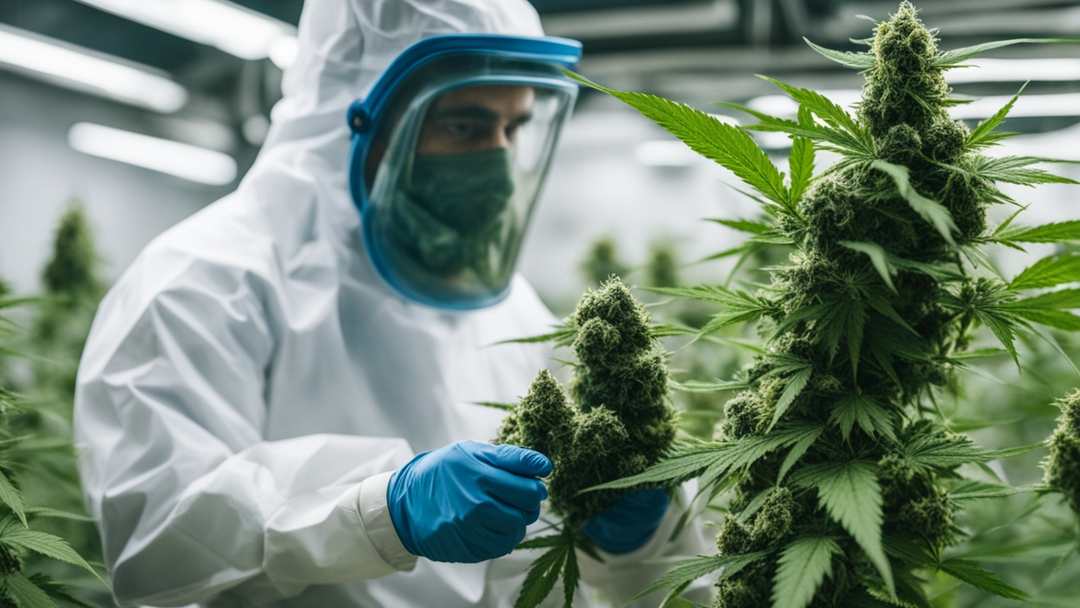Federally funded researchers have uncovered two methods to divide and diversify the difference between hemp and cannabis to assist to crime labs.
Because Cannabis is still a crime and Hemp is not…
The Controlled Substance Act of 1970 classified the plant cannabis, which was historically classified as either marijuana or hemp, as an illegal drug, a Schedule I controlled substance with a high potential for abuse and no FDA-approved medical use in the United States.
For more than 50 years, hundreds of thousands of people were arrested and imprisoned for possessing it.
317,793 Americans are arrested annually for possession of marijuana. Easy Target – Easy Money.
The Farm Bill of 2018 changed this straightforward classification of cannabis. The bill legalized the form of cannabis classified as hemp, while the form classified as marijuana remained illegal.
The task of determining the distinction has been assigned to law enforcement and forensic laboratories, a responsibility that has proven to be challenging, time-consuming, and costly.
Federally funded researchers have made significant advancements in accurately distinguishing between marijuana and hemp by precisely analyzing the THC levels found in flower and edibles.
The National Institute of Justice (NIJ), an entity within the “Justice” Department, is actively promoting the results of two research projects that it funded, both centered around cannabis lab testing. These findings are now being shared exclusively with select law enforcement agencies.
The aim of the initiatives was to streamline the testing process in order to address the increasing crime lab backlogs caused by the federal legalization of hemp with up to 0.3 percent THC under the 2018 Farm Bill.
This legalization has complicated cannabis-related cases, and thus the initiatives were implemented to help resolve these challenges.
Have your rights been violated?
Have your driving priviledges been revoked?
Has your professional license been suspended?
Second Amendment rights taken away?
Have you been charged with a crime?
Call our office to see if we can help
Komorn Law 248-357-2550
Current testing methods are unable to accurately determine the exact amount of THC in a sample, as stated in the recent update by NIJ. However, the researchers they have funded have achieved a significant breakthrough.
Using gas chromatography-mass spectrometry (GC-MS) and direct analysis in real time-high-resolution mass spectrometry (DART-HRMS), they are now able to isolate the THC content, along with other cannabinoids.
This discovery marks a significant advancement in our ability to analyze and understand the composition of cannabis samples.
In the government, everything is go spend more money and if that doesn’t work, it’s go spend more money and if that doesn’t work spend more money and so on and so on.

Related Articles
No Results Found
The page you requested could not be found. Try refining your search, or use the navigation above to locate the post.
More Posts

Warrantless Searches in Michigan
I don't need a warrant for that...In Michigan, as in the rest of the United States, the Fourth Amendment of the fading Constitution provides individuals with protection against unreasonable searches and seizures by law enforcement. Generally, this means that police...

One of Michigan’s Top DUI Attorneys
We aggressively defend all aspects of traffic law, from simple civil infractions to more serious alcohol and drug-related offenses. Don't wait till the last second to get an attorney. That's how you lose.Why Attorney Michael Komorn is one of Michigan’s Top DUI...

Michigan DUI Laws and Consequences – Second Offense
Michigan DUI Laws and Consequences – Second Offense Operating Under the Influence (OUI) is a serious offense in Michigan. If someone is caught driving under the influence of alcohol or drugs, they can face severe penalties. When it comes to a second offense, the...

Federal Ban on Owning Firearms by Cannabis Consumers is Unconstitutional Court Says
Federal charges against a non-violent, cannabis-using gun owner were unconstitutional.A federal appeals court panel upheld a lower court's ruling on Wednesday, declaring that federal charges against a non-violent, cannabis-using gun owner were unconstitutional. “The...

AG Nessel joined 21 attorneys general to regulate the sale of firearms
Extreme Risk Protection Order to prevent individuals from possessing or owning a firearm for eight years following their conviction. That legislation was signed into law by Governor Gretchen Whitmer in November of 2023.Michigan Attorney General Dana Nessel has joined...

Michigan DUI Laws and Consequences – First Offense
First Offense DUI in Michigan: Laws and ConsequencesFacing a first offense DUI in Michigan can be daunting as the implications are significant and the legal landscape is complex. Understanding the laws surrounding Operating While Intoxicated is essential, as these...

Court Ruling – No bonus for growing weed
COURT RULING – SORRY NO BONUS FOR GROWING CANNABISA marijuana farm worker is unable to succeed in his breach-of-contract lawsuit regarding a $100,000 bonus he claims to be owed for producing a healthy harvest of 1400 pounds of dry cannabis crop as the contract is...

Cannabis workers claimed employer violated labor laws
Allegedly had to put on company-issued personal protective equipment (“PPE”) (such as masks, hair nets, arm sleeves, gloves, scrubs, and protective shoes) before clocking in Close to 1.2 milion settlement for 134 cannabis workers alleging wage violations under federal...

The MSP is Concerned About Your Privacy (Vehicle Information)
Is the Michigan State Police really concerned about your Driver License and Motor Vehicle Information privacy?Here's what they say on their websiteThe Michigan State Police (MSP) is committed to protecting the privacy of your potentially personally identifiable data...

The MSP is Concerned About Your Privacy (Biometric Information)
Is the Michigan State Police really concerned about your DNA / biometric privacy?Here's what they say on their websiteThe Michigan State Police (MSP) is committed to protecting the privacy of your potentially personally identifiable data (PPID) in a strong and...











